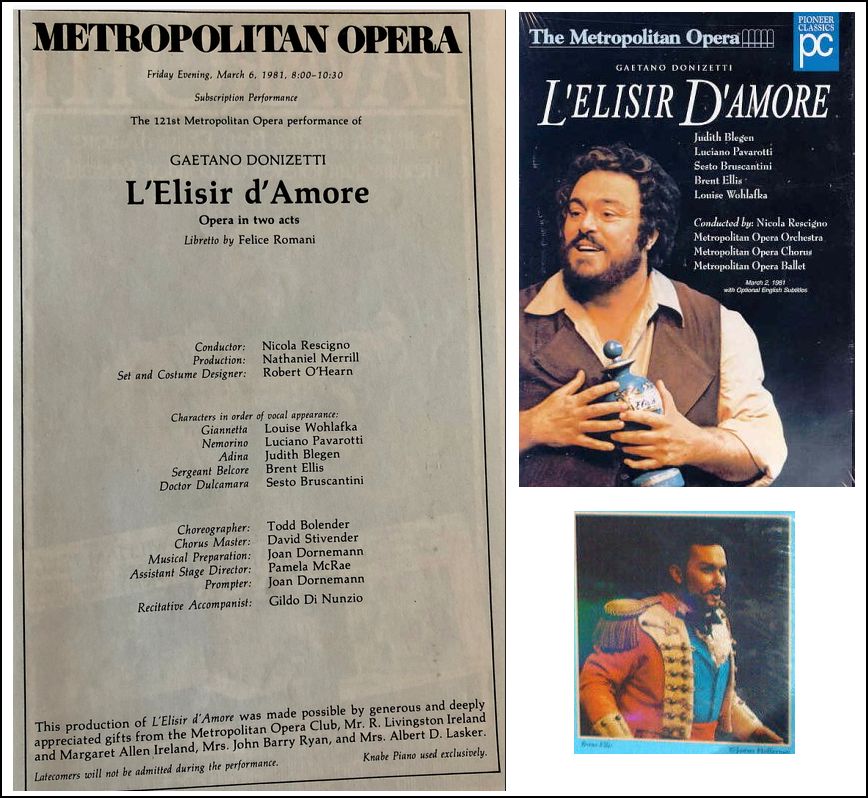Baritone Brent Ellis
A Conversation with Bruce Duffie
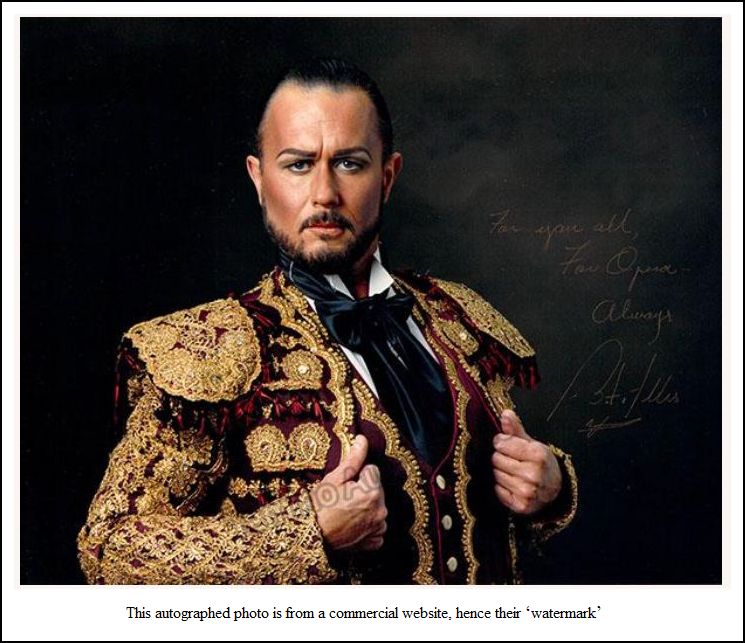
Ellis, Brent, American baritone;
b. Kansas City, Mo., June 20, 1946. He studied with Edna Forsythe (1962–65),
Marian Freschl (1965–71), and Daniel Ferro in N.Y. (from 1971), where
he also attended classes at the Juilliard School of Music (1965–67; 1970–72).
In 1965 he made his first appearance at the Santa Fe Opera, where
he later sang regularly (1972–82); also appeared at the Houston Grand
Opera (1972–81). In 1973 he won both the WGN Radio Auditions of the Air
and the Montreal International Competition, and on April 28, 1974, made
his N.Y.C. Opera debut as Ottone in L’incoronazione di Poppea then
sang with the Chicago Lyric Opera (1973), the San Francisco Opera (1974–78),
the Boston Opera (1975–83), the Glyndebourne Festival (1977–78), the
Hamburg State Opera (1977–79), and the Vienna State Opera (1977–79). On
Oct. 25, 1979, he made his Metropolitan Opera debut in N.Y. as Silvio
in Pagliacci.
From 1984 he sang at the Cologne Opera. In 1989 he made his first
appearance at London’s Covent Garden as Rigoletto. He sang Amonasro in
Seattle in 1992. In 1996 he portrayed Dandini in La Cenerentola in
Toronto.
|
The summary above gives just a few of the places and roles
which Brent Ellis sang. Here in Chicago, he first appeared with Lyric
Opera as Guglielmo Cecil in Maria Stuarda which opened the 1973
season with Montserrat Caballé, Viorica Cortez, Franco Tagliavini,
and Donald Gramm, conducted
by Bruno Bartoletti.
He would return as Germont in Traviata in 1988 with Anna Tomowa-Sintow, Neil Rosenshein/Jerry Hadley, again led
by Bartoletti, directed by Giulio Chazalettes, and finally in 1997 as
Captain Balstrode in Peter Grimes, with Ben Heppner and Emily Magee, led by Sir Mark Elder, directed
by John Copley. With
the Chicago Symphony, he sang in the Symphony #8 of Mahler conducted
by Sir Georg Solti.
[Names which are links refer to my interviews elsewhere on my website.]
During his last visit in 1997, I had the pleasure of speaking with
Ellis between performances. Portions were used on WNIB, Classical
97 a few days later to promote further performances. Now I am able
to present this transcript of the entire chat.
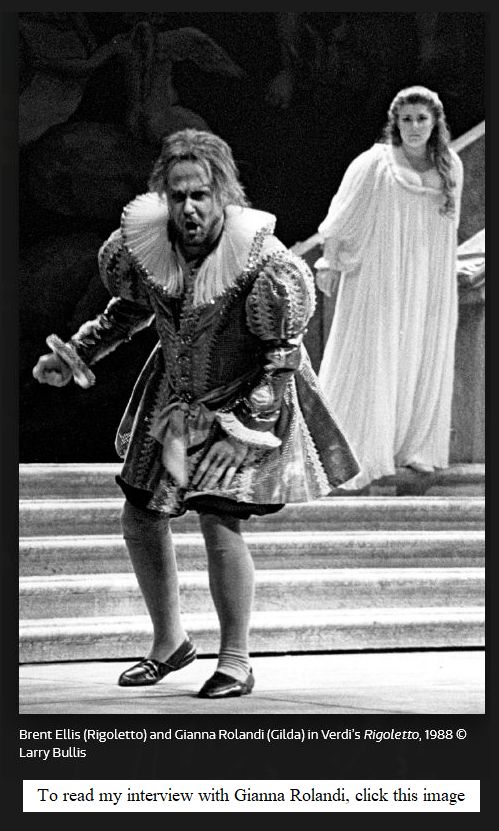
Bruce Duffie: We were talking about the health
of the singer. Are you like an athlete? Do you have to make
sure that you stay in condition every minute of every day of your life?
Brent Ellis: [Sighs] We’re very much
like athletes, but how we stay in condition is kind of a different ball
game — play on words!
[Laughs] The important factors for singers are things that
people don’t think about. People always understand it, but they
don’t think about it.
BD: Like humidity?
Ellis: First of all, a cold to a singer is
devastating. A cold that progresses into an infection is career-threatening,
therefore we all have a very good knowledge of ENT medicine. Anybody
who’s been in the profession for a decade or more, has really learned
their own body, and what they have to watch out for. Staying in
shape is a game of traveling because of the fact that we travel all the
time. If you’re not healthy enough to live that kind of life-style,
you won’t make it in the business. There are examples today of
singers who have physical problems that stop them. I certainly
have gone through those things in my life, but God has been with me,
and I’m stretching into the third decade of my career now. It’s amazing
that we can keep it going as long as we do. But yes, everybody tries
to keep some kind of exercise program going. Everybody is conscious
of some kind of diet. Whether we stay on it or not is a different
story, and I’ve got to say I’ve gone through health kicks where I’ve
been on the road and consumed less than 30g of fat per day. I’m not
doing that right now, but we really have to pay attention to all of that
life-style.
BD: Do you find you are doing that more these
days because there’s more of a health-consciousness now than thirty years
ago?
Ellis: This is not to contradict you, but our
health-conscious scare came during the 1980s. During that period,
singers were not asked, but they were forced to think more about how they
looked than we’re thinking now in the ’90s.
The late ’70s and the early ’80s
were the days when you saw a lot of strangely thin singers. I don’t
think it was a productive time for the art form. It took away from
a lot of vocal talent that was there. A lot of people lived through
it and are still producing these days, so we didn’t die because of that,
but I don’t think it was healthy that we were all trying to stay at our
trimmest and still produce the kind of sound that we’re expected to produce.
BD: We’ve just been talking about physical
health. What about vocal health... or do those two ideas wrap into
one another?
Ellis: That’s absolutely part of it. Your
question about whether a singer is an athlete or not has to do with one
of the smallest muscles in our body, and that’s what we’re trying to protect
and enhance. Being ‘physically healthy’
means to contend with the traveling, and the rehearsal schedules, and
the performing. That three hours of intense physical work is absolutely
an Olympic athlete walking out on the track to start a race. There’s
no question about it.
BD: When you come to the end of the performance,
can you let down immediately, or does it take a while for you to cool
down?
Ellis: It absolutely takes a while. Not
many of us can get to sleep before three or four in the morning after a
performance. Your body is way too keyed up to do that.
BD: We’ve been talking a bit about the body,
so let us move upstairs to the mind. You get keyed up for a performance,
and you get into the performance. How long after that final curtain,
and all the curtain calls, does it take for you to throw off the character
in your mind and in your psyche?
Ellis: Now you’re talking about acting.
Everybody has their own ability in acting on the operatic stage, and it
really depends a lot upon the piece, upon the character, and upon your
involvement. This Peter Grimes performance has affected me
more than I knew that it would. This is my first experience with
Grimes, so I didn’t know that it would have such a heavy weight
on me when the show was over. I like that kind of involvement.
It means a lot to me, but certainly, when I finish doing Escamillo, or something
like that, it’s not so hard to skip out of the opera house. Rigoletto
is physically exhausting, so when you’ve finished, you’re not only drained
because of the emotional impact, but you’re physically exhausted, too.
So you’re pretty wrung-out when you leave the opera house.
BD: Because of the hunch on your back?
Ellis: Yes, if one is serious about that.
BD: Does this influence how you set up which
performances you’ll accept — the
hard ones, then easy ones in succession?
Ellis: That’s a growing process in a career,
and as in any career, you really can’t learn it all in the first ten
years.
BD: [With a bit of alarm] You don’t mean
to write off the first decade, do you???
Ellis: No, you don’t write it off, but certainly
when you get into your third decade, you realize that there are lot of
things which were foolish in the beginning. One of those things
in my case was the fact that I had a certain type of role that I wouldn’t
accept. During my second decade, I wondered why I did that.
I didn’t understand it. Now I understand it is not only nice to have
a rest from some of the heavy-heavy roles, but also an emotional rest,
so that you’ve not just out there singing Macbeth and Rigoletto every other
production. Now I understand the importance of Sharpless [Madama
Butterfly], and even Germont [Traviata]. To have those
scattered in with the heavy schedule is fantastic, because it gives you
a little time to breathe, but yet be serious about what you’re doing. That’s
something you have to learn later on. In the early days, you’re
gung-ho to sing every heavy monster you can, and it can kill you.
* * *
* *
BD: Your voice is a baritone, so your characters
are going to be dictated by that vocal range. Do you like the
characters that are imposed on you, or would you rather play the young
lover once in a while?
Ellis: No, I love the characters that I’m given.
BD: [With a gentle nudge] You don’t
miss getting the girl?
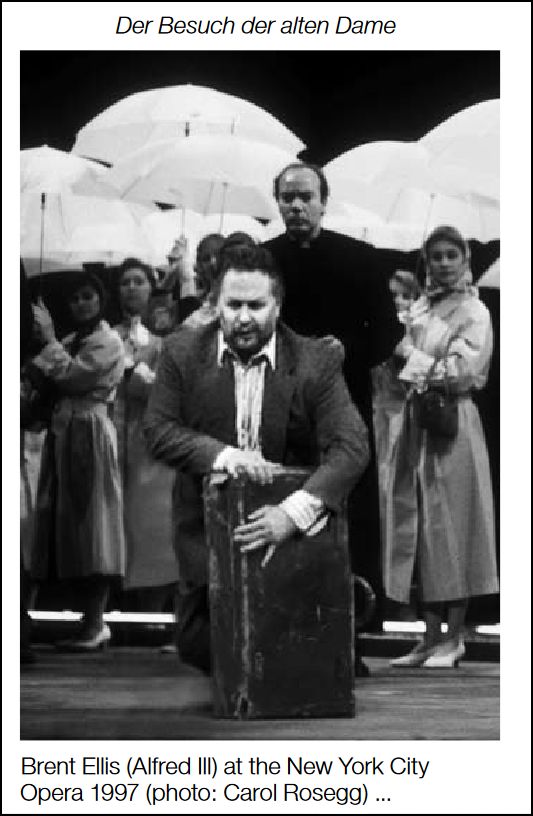
Ellis: Not really! There’s enough
within the characters of Scarpia [Tosca] and Iago [Otello]
to make up for not getting the girl. You can’t beat that kind
of mental anguish and pain. It’s wonderful! [Laughs]
You have to be a little masochistic, but it’s great fun. I love
the baritone world, and the only thing I miss in the tenor realm are the
fees.
BD: Should the leading baritone get as much
as the tenor?
Ellis: We do sometimes, but I certainly don’t
envy them the pressure that they’re under most of the time. I would
hate to have a career where I went from job to job, knowing that I was
going to have to take the voice to the absolute ultimate every time. Most
tenors are on that edge most of their lives.
BD: So for the tenor it’s
the high C. For the baritone, maybe it’s
the A-flat in the Prologue of Pagliacci?
Ellis: A-natural is usually what baritones
dread. If you’ve got an A-natural to sing, you’re sitting backstage
pacing and praying to whatever gods are with you. A-flats we live
with like tenors live with their Bs and B-flats.
BD: We’ve talked about balancing the career
and the roles. Let me go one step further. When you’re offered
a role, how do you decide to accept it and learn it, or to set it aside?
Ellis: You hope for a lot of things. You
hope that you have gotten good guidance from your management, and from
the coaches and teachers that you work with, because nobody ever does
that on their own. Not once or twice, but probably ninety per cent
of the time, if I’m presented with a role that I’m not really familiar
with, I’m on the telephone immediately calling people and asking what they
think. Is this the direction I should go? While I don’t rely
on just one person, I do know what percentage of weight I should put on
each person I talk to.
BD: Can you assume that if you’re offered a
role, someone has seen or heard that in your voice, or seen that in your
character?
Ellis: Oh yes, but I’ve been offered some
pretty silly things in my life, too. For instance
— and I love this story
— I had done Don Giovanni at Glyndebourne
in the late ’70s, and the next offer I had from
them I turned down, and because of that, I really made some enemies for a
while. I got a telex — which
we were using back then — and
they offered me Pizarro in Fidelio. I jokingly sent back
a telex through my English agent saying I’d love to sing Pizarro if I
can do Wotan on the off-nights! They didn’t think that was funny,
strangely enough! [Laughs] I went back later to do Traviata,
but it took a couple of years for them to heal after that. [Ellis
sang four roles at Glyndebourne: Ford in Falstaff (1977) with Renato Capecchi in
the title role, conducted by Sir John Pritchard;
Don Giovanni (1978) with Stafford Dean as Leporello;
Marcello in Bohème (also 1978) with Linda Zoghby as Mimì
and Ashley Putnam as Musetta in the John Cox production; and
Germont (1987) with Marie
McLaughlin as Violetta, conducted by Bernard Haitink, and
staged by Sir Peter Hall.]
BD: Having seen your Balstrode, I can imagine
you as Pizarro, but this, of course, is fifteen years later.
Ellis: That’s fifteen years ago! [Bursts
out laughing]
BD: Even early in your career, were there
roles that you knew that you would take up ten or twenty years down
the line?
Ellis: There were roles that I hoped I would sing.
Because I started as a very lyric baritone, one of my great dreams in
life was to sing Rigoletto, and I have been able to sing that role all
over the world, in some of the greatest houses. It’s been a dream
come true, and every time I approach that role for a new production, it’s
Heaven on Earth for me. But yes, there are things now that I look
at and feel they would really be wonderful. It is an ongoing process
of maturity. I’m not sure that it’s vocal maturity, because there
are some — especially
some of the Verdi roles — you
don’t touch until you’re my age, that I know would have been easier to
sing when I was twenty-eight or twenty-nine. It’s strange, but they
wouldn’t have had the depth that I could give them now. There’s no
question about that.
BD: Is there any part of your career where
you had the voice and the depth together?
Ellis: I don’t know. I ‘m not sure.
By luck, I’ve worked with some of the great baritones in the world,
and Giuseppe Taddei said to me that it was the stars. He says
it just happens, and when it happens you have to be thankful.
BD: Coming back to my question, when you get
offered a role, what is it that makes you say yes or no?
Ellis: [Thinks a moment] Study.
I was recently asked to do the New York premiere of Gottfried von Einam’s
The Visit of the Old Lady [Der Besuch der alten Dame, photo
shown above-right.] First of all, I knew of the play, but I had no
idea there was an opera written, even though it had been done in many places.
Immediately I got on the phone and called people who I knew would
know about it, and the next step was to get the score. After I got
the score, and went through it, I realized that I needed more information,
so I got a tape of the San Francisco production, and listened to that. Even
after all that, I still didn’t have a clue whether I wanted to do it or
not.
BD: That’s a bad sign.
Ellis: It was a bad sign, but for me it’s not
the last sign because this is a complex piece, and I knew that. There
was no question of that in my mind, and it took my re-reading the play
to realize that it wasn’t particularly about doing the opera that I should
be interested in. It was the whole project, and as it turned out
it was a fantastic project. It was a fantastic role, and thank God
I got the opportunity, because it was one of the things in a career that
you dream about. We didn’t have the press and all of that, but that
doesn’t matter. It was wonderful. [Joyce Castle appeared as the
Old Lady, and the work was conducted by George Manahan.]
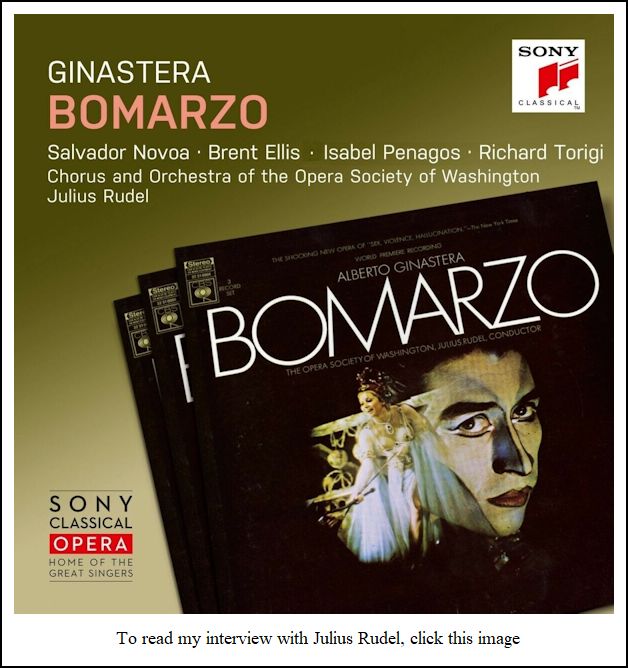
BD: It was personally satisfying?
Ellis: Personally, intellectually, and vocally.
BD: Did it also satisfy the audience?
Ellis: Basically, I think it did, yes! It
had the impact that we expected it to have, although that’s a bizarre
impact. It’s a very strange piece, you know, very strange.
BD: You’ve done quite a number of new operas.
Ellis: Thank you! [Laughs] A lot
of people don’t know that.
BD: Is this a good thing or a bad thing for
a career?
Ellis: As I say, a lot of people don’t know it,
so it hasn’t had much of an effect on me. We have a wonderful
group of singers in Peter Grimes, at all states of their careers,
so it’s a group you can just spend hours being around and enjoy every
second of it. Somebody said they’d heard that I did some contemporary
stuff when I was a kid, and strangely enough I’ve done a lot during my
life. It did so happen that I did a lot of world premieres when I
was young.
BD: Is this something that the public should
know about you?
Ellis: People tend to forget it.
People forget that Plácido started with Ginastera’s Don Rodrigo
at the City Opera. That was his big claim to fame. Then they
get you hooked in another world, and it’s fine because the experience is
more important than the details. I knew Ginastera, and Thomas Pasatieri,
and Carlisle Floyd.
Those are just incredible things in your life. [Recording of
Ginastera’s Bomarzo shown at
left. A photo from Pasatieri’s
The Seagull is shown below-right. A photo from Floyd’s
Of Mice and Men is shown farther below-right.]
BD: Is it special to work with a composer, especially
when he’s writing a role for you?
Ellis: Absolutely, absolutely!
BD: Having worked with some living composers,
does that make you understand Verdi, and Mozart, and Bellini, and all
of the others a little more?
Ellis: I’m glad you ask a question like that.
Yes, I think it does. Does it help you in production? No.
For many years, I’ve done my studying from orchestral scores, and I
do that for self-preservation. The mistakes that are usually found
by conductors in rehearsal are the mistakes that take place between orchestral
scores and piano-vocal scores. Therefore, I started using orchestral
scores to save myself, and I found out pretty early on that, in the end,
it really didn’t matter what your knowledge was of the piece. You
come in with your belief, and the people that you’re working with come
in with their belief, and in essence, the director and the conductor are
holding more weight than you are, except at the last possible moment, which
is the moment you walk on stage. That’s part of our conditioning,
and our life is to find out how to gear ourselves so that by the end, our
artistic statement is actually made from the moment we actually walk on
stage, not what we do in rehearsal, and certainly not what we do in preparation
with the conductors and directors.
BD: Should it not be a culmination?
Ellis: It is! No, I’m not saying we walk
out and do what I want to do, but I am saying that our true artistic
statement isn’t made until we have a chance to be on our own, where somebody
can’t stop us. We have to be allowed to do what we as artists know
is correct. That’s not to say that there aren’t some jerks out there
that are going to hold high B-flats for fifteen minutes when there’s no fermata
[hold mark], but that’s when you find out what kind of artists you’re dealing
with. The audience doesn’t know, and that’s not to say that they’re
supposed to know, but that’s the way it is.
BD: In rehearsal you keep working at it, and
working it toward the opening night. Does it then get better or
different on the third, and the fifth, and the eighth performance?
Ellis: Absolutely, yes. We hope it gets better
every time. That’s not to say that you don’t shoot for the highest
plain you can get, but especially with a new role, you hope that by the
time you finish the show, you are worlds away from where you started.
That’s not to say that this isn’t true with a role you have done
a million times, because in a new run of an old role you should end up
in a different state than you started. It’s art, so it changes, and
if it doesn’t change, there’s something wrong with you. You have
to be thinking, and reacting, and making it something special, or there’s
no reason to do it.
* * *
* *
BD: We’re kind of dancing around it, so let me
ask the easy question. What is the purpose of music?
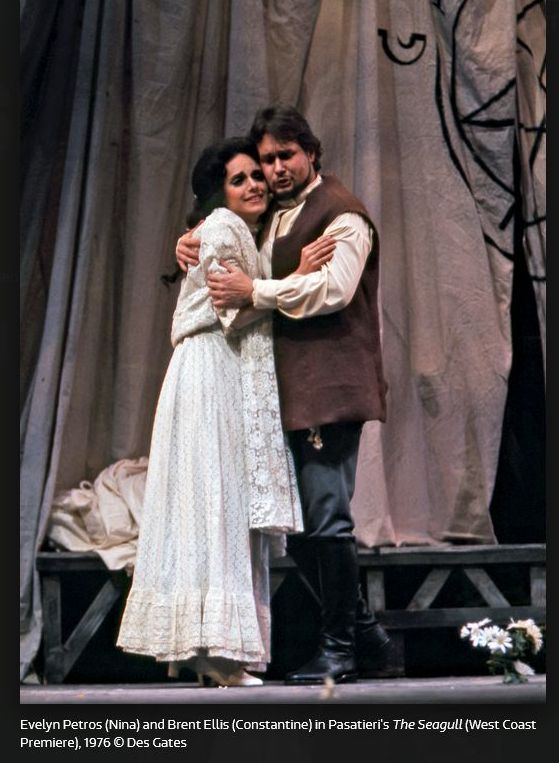
Ellis: Oh, boy! [Thinks a moment] I
started as a professional folk singer when I was fifteen years old. I
sang in restaurants, and my uncle’s clubs in the western part of America.
My dream in life was to be an entertainer having to do with music.
This meant being a singer. I had no idea I was going to end
up in opera. To me, music is one of the most important things in
our lives, and I do say that out of prejudice. There’s no question
about that, but it’s easier to address it by asking what the world would
be like without it. I feel it would be pretty damned dull in all respects
including sensually and mentally. It would just be dull. If you
explore sound, which is music, it’s so important to us. That’s not
to say that deaf people live in world that’s horribly inferior... although
it is to me. I have acute hearing loss, and I wonder what it must
be like to not hear at all. I understand that one can feel it, because
we do feel vibrations. I’ve seen deaf people at the opera and rock
performances, and they really get into music by the vibration part of it.
So it exists there, too. But to me, music is one of the most
important things in life, even above eating somehow! [Both laugh]
BD: My goodness! Now you bring up a word
that I want to pounce on...
Ellis: [Interrupting] Eating?!?!
BD: [Laughs] Well, yes eating, but beyond
that, ‘entertainment’. In opera, where it the balance between the
art and the entertainment?
Ellis: I hope it’s always entertaining.
If it’s not entertaining, we’ve missed it somehow, and I won’t just
put the blame on ‘we’ meaning the musical side. The audience has
missed it too. In opera, as in any art form like this, if you
come without doing some homework, or at least a little study time reading
your program before it starts if it’s a new piece for you, then you’re
probably not going to really enjoy it as much as you should. We
all know that. You and I know that when we go to a new piece, if
we don’t at least read the program before it starts, it’s kind of silliness.
You can’t just be expected to find entertainment if you’re ignorant about
what’s going on.
BD: Do you find that the supertitles help?
Ellis: I’m a big fan of supertitles, yes.
I’ve been debating that with people for years, and I’m so thrilled to
see that people are finally jumping on it. I don’t know why we haven’t
understood that it was just another step to keep this art form alive and
make it accessible to people. Anything we can do to make it a little
easier for the public is a good thing. Even if it’s in English you
have a hard time understanding all the words. This is true even
for a Broadway show.
BD: Do you work particularly hard at your diction,
especially when you’re singing in English for an American audience?
Ellis: We all work very hard at our diction no matter
what language we’re singing. That’s just part of the game. I
was born with good diction. It’s a gift and it’s a curse. If
I screw up, you’re going to know it in any language. But yes, I
work very hard at it. In a sense, knowing that my diction is good,
means that I have to be more careful because you really can understand
what I’m saying. The fellow who does the subtitles here, Frank Rizzo,
is a close old friend of mine. He would notice every word ending,
and has corrected me many times about things like ‘whispered’
and ‘whispers’. So I have
to be very careful, and that’s fun. That’s what makes it interesting.
BD: When you sing an Italian opera in Italy,
are you understood?
Ellis: Oh yes. I’m very familiar with
Italian and French. German is okay, but we really have to be very
careful about the way we learn things, because you will be singing in those
countries and you’re going to be put up against singers from those countries.
On the international circuit you’ve got to be good. People
can get away with a lot in some places, but on a world-class level it’s
got to be good.
BD: Do you feel that you’re in competition with so-and-so’s
recording, or so-and-so’s video, or so-and-so’s performance from twenty
years ago?
Ellis: Absolutely, yes. I want to do
it as good as those artists, but generally we’re all egotistical enough
to think that we can do it better than the others. That’s why we’re
in this. There aren’t many singers who wouldn’t say that so-and-so
did it, but he couldn’t really do this or that. That’s just part
of the game. [Both laugh] It is an Olympic sport. You’ve
got to really believe in what you’re doing, and it’s blood-thirsty at times.
When you walk out there, it’s ‘take no prisoners’.
You really have to approach it that way because that’s how physical singing
is.
BD: And yet you say you’re friends with other baritones.
Ellis: Oh sure, yes, absolutely. It’s
not the baritones I have to worry about! [Both laugh] You have
to watch who you’re singing with.
BD: Being a baritone, sometimes you kill and
sometimes you are killed. Which is better?
Ellis: I don’t know. It doesn’t mean
anything except within the context of the piece itself.
BD: Are there any of the characters that you
either do have done that are perilously close to real Brent Ellis?
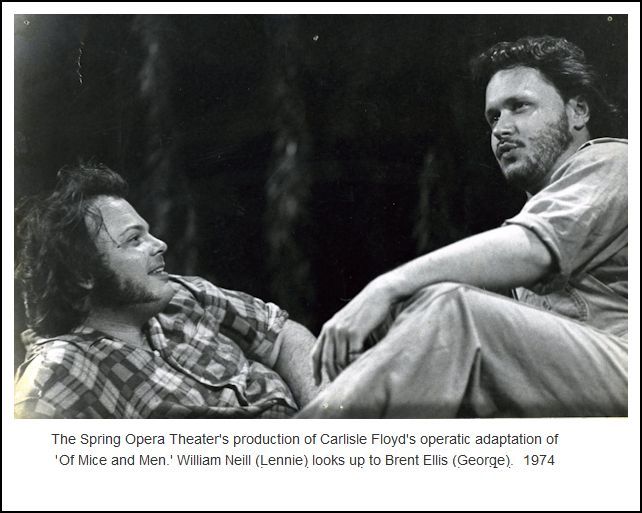
Ellis: There are some that I hope are. It’s
like any actor. You have to draw from some strange part of your
body to do a lot of parts. George in Of Mice and Men [shown
at right] is very close to me as a human being, but that’s my interpretation
of George. I certainly say that this Balstrode is very close to
my own personality, but this is a different Balstrode than you’ll see in
a lot of productions.
BD: You make him very sympathetic.
Ellis: Yes, he’s very sympathetic, and we meant
it to be that way. We didn’t just stumble on that idea.
His relationship with Ellen is closer than you would normally see. We
thought that out. There are so many operatic characters that you
can understand, and feel you would want to be part of that character. There’s
no question about that. Actors run into that all the time, and as
to the killers and the crazy ones, you hope that’s not part of your personality.
You look in the mirror before you walk on stage and go, “Oh,
this is fun, but I hope it’s not really me!”
BD: [The interviewer slides his chair slightly
away from the singer at this point, and both laugh] How do you
get really involved in a character that’s evil?
Ellis: Oh, that’s sometimes the easiest chore of
all. As I said, I adore doing Iago and Scarpia. They are
two of my favorite roles of all time because they are so complex within
their personalities. They are so strangely evil that it’s the most
fun to walk into the theater and know that for the next four hours you’re
going to be this demented character. Having studied and thought about
where this person really goes, and then given incredible music to mold your
character with, it’s the most fun that one can have coming up with this
loony person. Those two are just like they are from another planet.
But it’s so much fun. You can’t help but adore doing it.
BD: Is it a bit like having therapy each night
when you sing?
Ellis: It’s like therapy... well, strange therapy!
BD: Are there any characters that you play
that are maybe too nice, or too namby-pamby, or too one-dimensional?
Ellis: A lot of people won’t think this from recordings,
but believe it or not, I find Germont to be just a little too nice.
Even though he gets what he wants, and devastates a life, and
does those horrible things, in the end I think he compromises too much.
I find his soft-pedaling too soft. A director would debate with
me forever about this, and say that’s not what’s written, but I’m sorry.
If I felt that way about what my son was doing, he’d be yanked
out of there faster than Germont ever thinks about! [Laughs]
BD: It sounds like you don’t have very much
sympathy with the character of Germont.
Ellis: If he believes in what he’s saying,
no I don’t have much sympathy for him. Of course, that starts the
whole debate of what sort of relationship exists between the three of them.
But, as I say, if he really felt what he was saying, then his approach
would be even stronger than it is.
BD: You want to make him more real?
Ellis: Maybe that’s a key to it. [On
the subject of operatic characters being more real, in my interview with
Cornell MacNeil, I lamented
that Germont’s cabaletta is usually
cut, and MacNeil argued that it ruins the ending of that scene by delaying
Alfredo’s exit. He also speaks
about his own son, Walter, who became an opera singer, and who appears as
Alfredo in the Glyndebourne production with Ellis, which is available on
DVD, shown below-left.]
BD: Continuing that thought, when you
walk out on stage, are you portraying a character or do you become that
character?
Ellis: I love acting. I adore the whole concept
of acting. To me it’s as wonderful as the music. Putting
on a costume and make-up, and crossing the threshold of the stage is
one of the greatest gifts that you can be given. Then there is the
ability to go ahead and make a character. It’s a joy to explore
these people, and somehow you have to become them in one way or another
for a very short period of time... I mean a very short period of time.
In those seconds between where you’re calculating what you’re doing
as an actor and a singer and a performer, your mind switches off and you’re
actually in that character. Those are the moments when you’re there.
But, of course, what we do is acting. It’s calculated, and it’s thought
out.
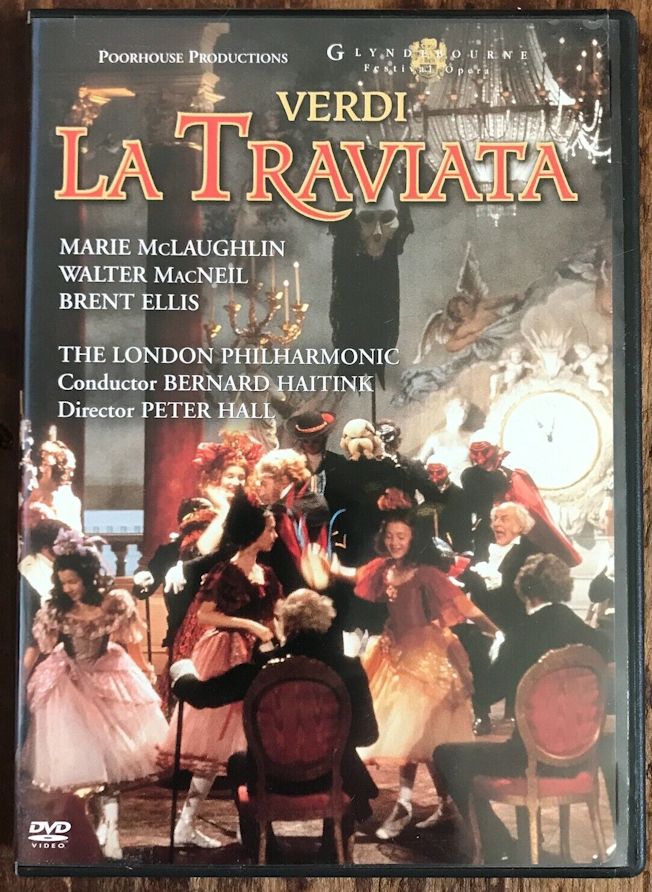
BD: You have to think about it and deliver
it?
Ellis: Hopefully, by the time you get there it’s pretty
well planned. If I’m about to walk across the stage and go up
a flight of stairs, I guarantee you I know how many steps there are between
where I am and where the steps are, and what foot I’m going to start up
the steps with. I might make a mistake now and then, but I normally
don’t. That’s the way I have to work, and I do that with everything.
That’s why I’m not really great on just a week’s rehearsal period,
because a week is just enough to throw you off. One day you can spontaneously
do things that will be calculated by absolute chance. In three weeks
they’ll be calculated by working on it, but one week is just enough to
really mess it up. So I don’t like that.
* * *
* *
BD: You sing a lot of opera. Do you also
give recitals?
Ellis: I have done a lot of recitals in my life.
I don’t do many anymore, but this is not to say that I wouldn’t like
to. I’m working right now on some Schumann and Schubert programs
to introduce to my management, and see if we can get something going with
them. It’s an obvious choice for my voice, because I’ve always had
the ability for a very light adjustment in my singing. That’s not
particularly what you hear on the operatic stage. Mostly you hear
the medium- to the extreme-other-end of my voice, but actually the easiest
part of my voice is the mezzo-forte to triple-piano singing.
I can sing that way to a nearly limitless range, so I’ve got a lot there
in the equipment that I can use. It just so happens to be the prettiest
part of my voice, so it’s an obvious choice. Now I just have to
go back and rework, and think about it a little bit, and see how we would
approach that at this point in my life. A career is a long and wonderful
experience, and I don’t particularly want it all to happen at the same
time. It’s great to have lots of places to go.
BD: When you’re singing a song recital, can
you act in each song?
Ellis: Absolutely. I was extremely fortunate
when I was a kid in the business to be subjected to some of the great
directors and actors in the business. Frank Corsaro is
a great friend of mine, and he taught me a lot about ‘presentation
acting’, and that goes right onto the concert stage,
too. When I was about twenty years old, I went to see a concert
that Frank had staged for [soprano] Patricia Brooks. It was a flat-out
concert, but he had choreographed every move that she made. Pat
Brooks was a dancer, therefore she was very into that kind of movement
and thought process, and it was brilliant. Not much of the audience
understood that it had been choreographed.
BD: Was that part of the brilliance of it?
Ellis: That was the brilliance of it, yes.
It was an amazing thought, though, when you consider a concert
like that.
BD: How much of the director’s
ideas put you in a straight-jacket, and how much sets you free?
Ellis: It depends on how you look at it.
I certainly don’t feel like I’m in a straight-jacket when I’m on the operatic
stage. I feel total freedom. The big difference is that
you would have to come to the realization that sometimes people walk
out and sing recitals doing it all impromptu. That’s fine, but
you had better be pretty brilliant to make that work. Impromptu
is impromptu, and it’s more than just knowing the
words that you’re singing. Unless you’re pretty brilliant with your
ability to express with your hands and your face, and know what it all
means, impromptu ain’t going to cut it. Acting on the concert stage
is a total monster. Dietrich Fischer-Dieskau was a great example
of that. When that guy walked out on stage, he knew everything he
was going to do, and that was amazing. I never saw one of his concerts
that I didn’t want to learn from it. I wasn’t a great fan of his
voice, but he would do things to you. Schubert’s Winterreise
puts me to sleep, but I remember when he did it, I came out like I’d had
twelve cups of coffee. I just couldn’t believe it.
BD: Are you at the point in your career that you
want to be right now?
Ellis: I’m at a very interesting point, that’s
for sure. I’ve made some steps in the past five years that
most people would be afraid to make. I basically decided that I
want to work a maximum of eight months a year, and a minimum of six. This
is just because I would like to keep a life going, and I found that eleven
months on the road isn’t really congenial to that.
BD: [With a gentle nudge] You mean you
want to be a real human being???
Ellis: [Laughs] A real human being, yes. I
made my debut when I was nineteen years old, and I’m fifty-one now.
I love this life, and part of the brilliance of an operatic career
is if you can have a long operatic career. That means there are
lots of ups and lots of downs, and a lot in between. Physically,
people are going to get sick, things are going to happen to you, but the
life that I’m leading right now in this business has been fairly controlled,
and I appreciate where I am. It’s not to say that I wouldn’t like
more of this, or less of that. It’s just ongoing, and I love the fact
that it’s ongoing. I love thinking that ten years from now, or hopefully
twenty years from now, I’ll still be involved in this. I mentioned
Giuseppe Taddei before. I did Falstaff at the Met with him
when he was seventy-one years old, and I had known him for about fifteen
years at that point. I just looked at him, and I thought this is great,
and if you’re serious in the business there’s no reason
that you can’t continue. You have to be logical with keeping a life,
and not burn yourself out in any direction. But I love this world,
and I love the art form, so if I can stay with it, I’ll be a happy guy.
BD: I wish you lots of continued success.
Ellis: Thank you.
© 1997 Bruce Duffie
This conversation was recorded in Chicago on October 16, 1997.
Portions were broadcast on WNIB a few days later. This
transcription was made in 2022, and
posted on this website at that time.
My thanks to British soprano
Una Barry for
her help in preparing this website presentation.
To see a full list (with links) of interviews which have been transcribed
and posted
on this website, click here. To
read my thoughts on editing these interviews for print, as
well as a few other interesting observations, click here.
* * * *
*
Award -
winning
broadcaster Bruce Duffie was with WNIB, Classical
97 in Chicago from 1975
until its final moment as a classical station
in February of 2001. His interviews
have also appeared in various magazines and journals
since 1980, and he now continues his broadcast series
on WNUR-FM,
as well as on Contemporary
Classical Internet Radio.
You
are invited to visit his website for more information
about his work, including selected transcripts
of other interviews, plus a full list of his
guests. He would also like to call your attention
to the photos and information about his grandfather,
who was a pioneer in the automotive field more than a century ago.
You may also send him E-Mail with comments,
questions and suggestions.








